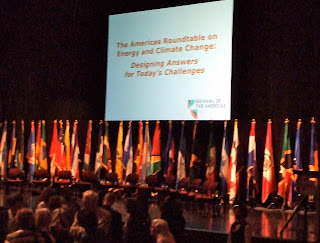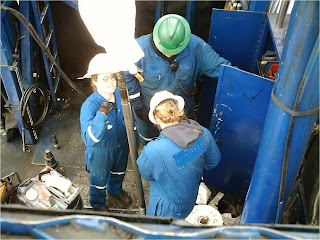
A remarkable group of leaders from the Western Hemisphere assembled recently in Denver at
"The Americas Roundtable on Energy and Climate Change."The roundtable drew nearly 1,000 attendees who heard from high-level representatives from government, industry, non governmental organizations, and citizen stakeholder groups from throughout the hemisphere.
The Roundtable was part of the
Biennial of the Americas 2010, an event that the city of Denver hopes to convene every two years to celebrate and inspire collaborations among the 35 countries that make up the Western Hemisphere.
Jim Polsfut, President of the Biennial of the Americas, introduced the Roundtable by saying that it was designed "to showcase the potential of building relationships in the hemisphere" to address energy and climate change issues.

The introduction to the Roundtable set out, in vivid terms, why energy and climate changes issues really are matters of hemispheric importance:
"Of the many ties that could bind the Western Hemisphere together more closely, energy production is surely one of them. The hemisphere has tremendous resources. Canada, Mexico, and Venezuela supply the U.S. with more than 40 percent of its crude oil. The U.S. and Colombia are among the top coal producers in the world, and Brazil is the world leader in producing and using ethanol as a transportation fuel."
Among the most interesting speakers and points they made:
- Carolina Barco (who incidentally biked to the event in her dress suit, thus proving, as she said, that woman can also bike to work), Colombian Ambassador to the U.S.: The electric power grid must be developed over the entire hemisphere so power can be moved from energy-rich to energy-poor regions; "Colombia is taking the lead on this by delivering energy to Central American countries" that need it
- Gary Doer, Canadian Ambassador to the U.S.: Transmission lines for renewable energy need to co-exist with transmission lines from "traditional sources" of electricity; there also needs to be honesty with ratepayers about the increased cost of implementing renewable energy
- David Eves: president of Xcel of Colorado: Power plants represent a 50 to 60 year investment for electricity generators; consequently, the power utilities must be able to accurately anticipate the environmental requirements as far into the future as possible, thus allowing the companies to make more informed investment decisions
- Ray LaHood, U.S. Secretary of Transportation (who also biked to the event): Nearly 70 percent of America's oil use is transport-related; high-speed rail is coming to the U.S., with the Obama Administration vision that by 2035 80 percent of Americans will be connected by high-speed intercity rail
- Lee McIntire, chairman and CEO of CH2MHill Consultants: "We are just beginning to wake up to the water issues" the world faces; up to one billion people a day carry fresh water at least 1/4 mile to their homes
- Sally Ranney, CEO of StillWater Preservation LLC: Land use must be considered in the context of renewables development as well as transmission siting issues
- Bill Ritter, Governor of Colorado: "We think Colorado has designed a 'template' for green energy policy and developing the green energy industry"
- Enrique Penalosa, president of the Institute for Transportation and Development Policy in Colombia and former mayor of Bogota: Light rail or underground systems are too expensive for many countries; "bus systems are the way to go" in terms of providing transportation solutions
- Jeff Wojahn, president USA division of EnCana Natural Gas: Natural gas can be a significant solution, but not the only solution, to providing another source to power transport, especially for cars
The program's final comments were made by Mr. Penalosa, who pointed out that the issue of moving people within cities had to be a major theme for the 21st century adding, "For 5,000 years, cities were all pedestrian. It has only been in the last 80 or 90 years that we have introduced cars into cities." He added, "If cities had hundreds of miles for pedestrians and bikes, it would completely change the way city life is organized."
In reflecting on the roundtable and the issues that were discussed, I thought about the Environmental and Natural Resources Law (ENRL) program at the Sturm College of Law and a number of observations came to mind:
- Building a more collaborative and stronger relationship among the countries in the Western Hemisphere makes perfect sense; the shared sense of history, cultures, values, and hopes for the future underpin all people in the Western Hemisphere
- The range of energy and climate change-related issues under discussion at the Roundtable are almost exactly the same ones that the ENRL focuses on: without going into exhaustive detail, the ENRL offers excellent courses in: Climate Change; Energy Law; Land Use Planning; Oil & Gas (U.S. and International); Renewable Energy Project Finance; Renewable Energy Policy; Sustainable Development; Water Law (U.S. and International), and there are many more
- The College of Law has two outstanding publications that address many of the related issues: University of Denver Transportation Law Journal; University of Denver Water Law Review
- The College of Law has established a pioneering effort called "Lawyering in Spanish," which assists students who will be serving Spanish-speaking clients
- The College of Law has developed a Latin American externship program with many of the finest firms and lawyers on the continent
- And finally, the College of Law has attracted many of the hemisphere's "best and brightest" -- from the north and the south -- to study about these issues. Among American law schools, DU consistently ranks among the top echelon of environmental and natural resources law schools. In addition, the ENRL master's of law program has attracted many of Latin America's brightest young lawyers and professionals who study in Denver and then return home with the aim of using what they have learned to improve policy making and business practices
The point is that the issues that were the subject of the Roundtable's discussion are clearly of fundamental importance in today's world. All of us have a stake in the successful consideration of these issues.
We at the University of Denver Sturm College of Law are actively involved in examining these issues and in building bridges among our hemispheric neighbors. Is everything in the neighborhood perfect? Do all the neighbors get along? Of course not. But on the other hand, what the panel talked about last week and what the ENRL is trying to do now is move the discussion forward knowing full well that no one has all the answers.
More than 60 years ago, Europe lay in tatters after the devastation of World War II. Many thought western Europe was finished as a political and economic world leader. But one man --
Jean Monnet -- envisioned an idea to bring Western Europe together: the establishment of the
European Coal and Steel Community. The concept was to address, on a regional basis, a key issue -- that is the coal and steel economic sectors -- that could be organized to benefit the entire continent. Many said he would not succeed. But in fact he did, trust was built, and today's Europe is peaceful and prosperous.
Now for just a moment imagine that the Western Hemisphere could also see its interests as one -- in this case safe, secure, dependable, clean, and affordable energy. Imagine that countries could work together in close collaboration for the betterment of the entire hemisphere. A far out idea? Perhaps for today. But just as the Roundtable demonstrated, the hemisphere's leaders are thinking about the future and it may be far different from what anyone sees today.
In other words, great opportunities may well lie ahead for those who are well informed, thoughtful, prepared, and open to new ideas.
--Don Smith
Director, Environmental and Natural Resources Law Program
 Working in the oilfield is generally perceived as the gushing derricks of Texas, with workers covered in grease and crude throwing around large tools and pieces of equipment. Times have changed since those days as technology and safety have advanced within the industry.
Working in the oilfield is generally perceived as the gushing derricks of Texas, with workers covered in grease and crude throwing around large tools and pieces of equipment. Times have changed since those days as technology and safety have advanced within the industry.





